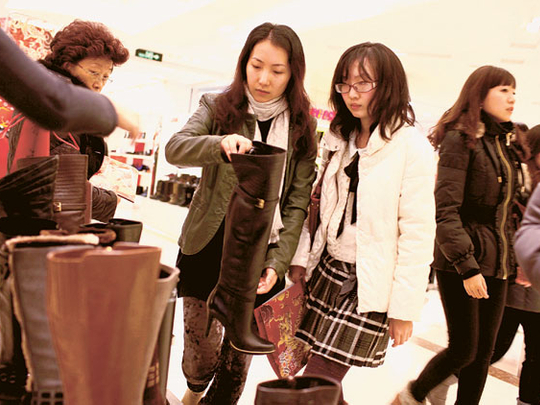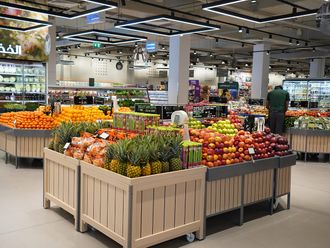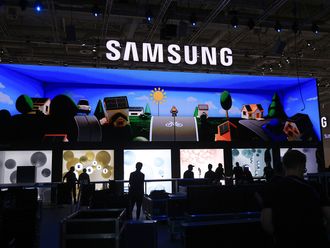
Beijing: Chinese shoppers on their Lunar New Year holiday were less lavish than expected by Hong Kong jewellers, curbed spending on beauty brands and slowed spending at South Korean stores. They may keep that pace in the coming year of the dragon.
Holiday sales on the mainland grew 16 per cent to 470 billion yuan (Dh273.51 billion), according to data from the Ministry of Commerce, the slowest pace since the 2009 financial crisis and three percentage points below last year's increase. China is finding it is not immune to global economic forces and the slowdown is hitting Chinese consumers, who may increase this year's spending at a slower pace than in 2011.
This may mean trouble for the growing number of foreign companies rushing into China, especially luxury brands, said Jason Yuan, an analyst at UOB Kay Hian in Shanghai.
"This year is going to be tough, probably the toughest year for many foreign luxury brands since they entered into China," he said.
"Sales of jewellery and valuable watches during Chinese New Year were quite disappointing," said Caroline Mak, chairman of the Hong Kong Retail Management Association. "Sales growth of over 30 per cent last year is unsustainable against a worsening macro-economic backdrop."
Smaller diamonds
Some member jewellers reported customers buying smaller diamonds than they used to, she said.
Hong Kong jeweller Chow Sang Sang Holdings International, whose sales grew as much as 28 per cent in the first three days of the holiday, expects quarterly sales growth to slow to 10 per cent in the second quarter from 15 per cent in the first.
Sales director Dennis Lau declined to make projections for the rest of the year because of worries a further global downturn could hurt consumer sentiment. "We can't see how strong the recovery in the US is, and the debt crisis in Europe never seems to end," Lau said. "If those economies mess things again, it could severely hurt global consumer confidence."
Twinky Choi, an assistant at a Hong Kong Shiseido Co cosmetics store, is seeing that first-hand.
"People are browsing," Choi said. "They don't buy instantly, unlike last year when customers were grabbing everything."
China's economic growth, hurt by a property market slump and slower export growth, is poised to weaken to 8.5 per cent this year from about 9.2 per cent in 2011, according to the median estimate of economists in a Bloomberg survey.
"The momentum is not exciting," noted Macquarie Capital Securities analyst Linda Huang.
The Lunar holiday, like Thanksgiving or Christmas in the US, is among the biggest selling periods in China and parts of Asia. Chinese consumers spend more at home and at overseas vacation spots such as Hong Kong and Macau. This year's holiday extended from January 23 to January 29 and marked the start of the year of the dragon.
Low momentum
"It does give some indications on retail sentiment," said Phoebe Tse, an analyst at Barclays Capital Asia. "It is one of the busiest shopping seasons."
Lipstick and fragrance seller Sa Sa International Holdings said Lunar sales were below its forecasts. The retailer's Hong Kong and Macau sales rose 17 per cent during the Lunar holiday from January 23 to January 29, which was "slightly below our expectations," said Chief Executive Officer Simon Kwok in a statement. "Looking ahead, the group remains cautiously optimistic."
Mak said her association expects Hong Kong retail sales growth to slow to 15 per cent this year from 25 per cent in 2011.
China's consumers have been hurt by a drop in home prices, which fell for a fifth month in January, according to SouFun Holdings, the nation's biggest real-estate website owner. Residential prices slid in 60 of 100 cities tracked by the company in January, according to SouFun. The benchmark Shanghai Stock Exchange Composite Index has also fallen 17 per cent over the past year, lowering the value of consumers' investments.
"Macro-economic uncertainties impact consumer confidence," Tse said. "They feel more secure when they have money in the pocket."
Chinese tourists on holiday drove up January casino revenue in the gambling centre of Macau 35 per cent to 25 billion patacas (Dh11.49 billion). Las Vegas Sands Corp's Sands China, Wynn Resorts' Wynn Macau and MGM Resorts International's MGM China Holdings compete in Macau, the world's largest gambling hub.
Home prices
Even so, high-stakes gamblers, who bring in the most revenue and can bet as much as $250,000 (Dh917,500) a hand, may not have boosted sales as much as previous years because of less available credit, BOC International analyst Edwin Fan said.
Banks have less money to lend because China's policy makers have raised interest rates and reserve ratio requirements.












